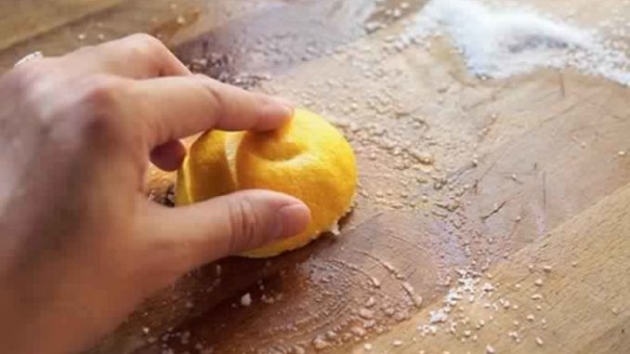

If you’re like the rest of us, you have a pantry full of pans that have seen far better days. But, even though these pans look old and crusty, there’s still a little beauty hidden beneath all of that build up. If you’ve spent too much time scrubbing these pans to no avail, you may feel like junking them and starting over.
Before you toss the rusted pans, take a look at a few of these tips to bring new life to your cookware, and other trouble spots in the kitchen. You’ll save a little cash (and the environment), while you’re at it.
Pan Pains:

Foil the stains:
If you forgot to grab a new scouring pad (or yours just isn’t doing the trick) grab a piece of tin foil, crunch it in a ball and get to work, Reader’s Digest recommends. Use caution on non-stick cookware as this could scratch your pans.
If you forgot to grab a new scouring pad (or yours just isn’t doing the trick) grab a piece of tin foil, crunch it in a ball and get to work, Reader’s Digest recommends. Use caution on non-stick cookware as this could scratch your pans.
Create your own cleanser:
Make your dish soap more effective with a little baking soda. Reader’s Digest suggests adding two tablespoons of the cookie ingredient into your cleaning solution. The baking soda cuts through grease and acts as a scrubber.
Hit up the laundry room:
Head to the laundry room and grab your liquid fabric softener. Soak your pans in water and a bit of your favorite brand of softener. Soak for at least an hour. Your stains will wipe away with no scrubbing necessary.
Ketchup to the stains before it’s too late:
Use your favorite fry-dipping-sauce to clean copper pots and pans. The acidity of the tomatoes helps remove tarnish from your favorite copper cookware. Coat your piece in ketchup and let it soak for at least 10 minutes before rinsing and drying.
Kitchen essentials

Disposal woes:
Does your garbage disposal smell funky? Try this recipe from New Leaf Wellness to get rid of the odors for good. Cut the peels from three lemons into small chunks and place a piece into each section of an ice cube tray. Fill the rest of the each compartment with distilled white vinegar and freeze. Toss one or two in your disposal and grind them up when it starts to stink.
Does your garbage disposal smell funky? Try this recipe from New Leaf Wellness to get rid of the odors for good. Cut the peels from three lemons into small chunks and place a piece into each section of an ice cube tray. Fill the rest of the each compartment with distilled white vinegar and freeze. Toss one or two in your disposal and grind them up when it starts to stink.
Shine your stove:
Want your stove to look brand new? Try rubbing it down with a layer of car wax. Not only will your stove shine like a new car, spills and stains will come off with ease, saving you time in the kitchen, Real Simple says.
Want your stove to look brand new? Try rubbing it down with a layer of car wax. Not only will your stove shine like a new car, spills and stains will come off with ease, saving you time in the kitchen, Real Simple says.

Rubbing salt in the wound
Wood cutting boards are beautiful, but they have a bad reputation for soaking up odors and germs. Using dish detergent can wear down the wood or cause it to crack. To keep it clean and safe, scrub your board with a half lemon (as the sponge) and salt.
Wood cutting boards are beautiful, but they have a bad reputation for soaking up odors and germs. Using dish detergent can wear down the wood or cause it to crack. To keep it clean and safe, scrub your board with a half lemon (as the sponge) and salt.
To keep your wood board from cracking, rub it down with food grade mineral oil once a month, according to Persimmon and Peach.
Cook those germs and smells
Sponges are one of the germiest places in your kitchen. They are wet, frequently exposed to heat and porous: a hotbed for bacteria for growth. Instead of tossing those sponges in the garbage, try tossing them in your microwave. Heat them (wet) for a minute or so every other day. Let them cool off before you snag them out of the microwave.
Sponges are one of the germiest places in your kitchen. They are wet, frequently exposed to heat and porous: a hotbed for bacteria for growth. Instead of tossing those sponges in the garbage, try tossing them in your microwave. Heat them (wet) for a minute or so every other day. Let them cool off before you snag them out of the microwave.
Share this with your friends on Facebook and save them some a bit of time (and cash) keeping their kitchen clean.